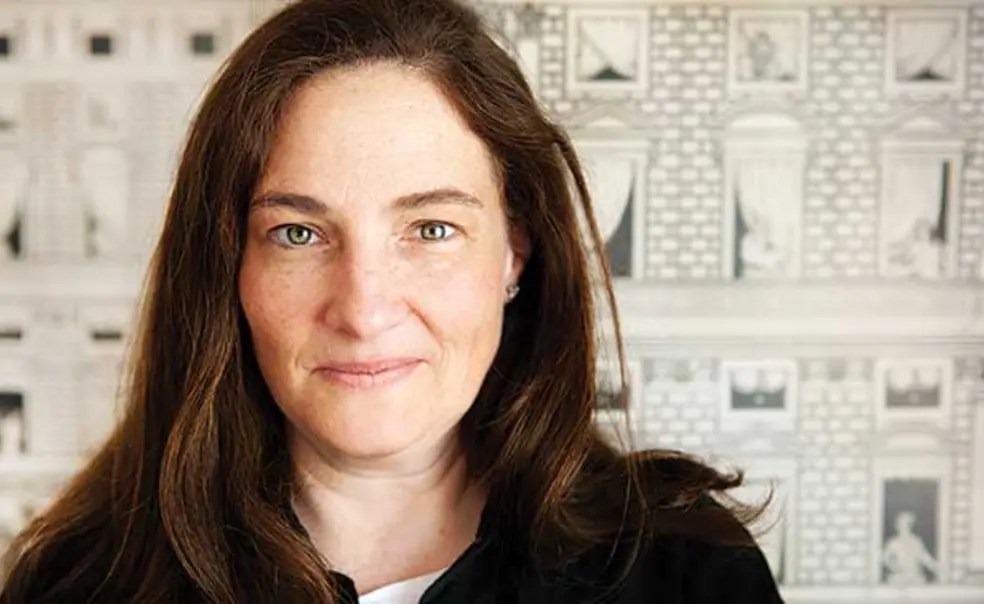Creative Writing: Apocalyptic Opera
A novelist brings her darkly humorous sensibility to an opera’s libretto
When novelist A.M. Homes was a child, she waited in the back seat of the family car on Saturday afternoons while her mother and grandmother had their hair done and listened to the broadcast of the Metropolitan Opera. Today, she has written her first libretto, and her opera is nothing like the ones on the radio. Chunky in Heat tells the story of a teenage girl grappling with sexuality, body image, and the influence of technology. Like so much of Homes’ fiction, it upends expectations.
Homes, a lecturer in creative writing, says she studied other librettos to discover, “What are the rules of the form, and how can I break them?” Chunky in Heat brings to life the story of a family Homes has written about in several short stories published over the last 30 years. The opera opens with Cheryl — nicknamed Chunky — lounging poolside in a pre-apocalyptic Los Angeles where a talking tree provides a narration of her life. Chunky’s sister eats only foods with 10 calories; their parents modify their bodies with plastic surgery following the death of their son. Reviewers dubbed the opera “hallucinatory,” “zany,” and “touching.”
Chunky in Heat is about “an absence of identity,” Homes told Vanity Fair. “I’m always writing, really, about human behavior and the human heart. And the dissonance, often, between our behavior and our heart.”
Commissioned by Experiments in Opera, which produces new operas that challenge the art’s conventions, Chunky premiered at New York City’s Flea Theater in May. It has music by six composers, who together chose which scenes each would score. One of the composers is Shelley Washington, who is in her second year as a Ph.D. student in music composition at Princeton. She has composed works for string quartets and choir ensembles and also performs as a baritone saxophonist.
Often set in suburbia, Homes’ tales are a hornet’s nest of betrayal, violence, and dysfunction behind closed doors.
Washington scored a scene between Cheryl’s parents that she was drawn to because it was “so intimate and emotionally raw,” she says. The freshness of the material delighted her. “An opera focusing on a young person going through puberty is not often seen in classical music,” she says. “It feels like a breath of something new.”
Chunky in Heat, like much of Homes’ fiction, depicts a family coming apart. Often set in suburbia, her tales are a hornet’s nest of betrayal, violence, and dysfunction behind closed doors. Reviewers have called her work “shocking,” “dangerous,” and “transgressive.” Her most recent novel, May We Be Forgiven (Penguin), a satire about sibling rivalry, won the 2013 Women’s Prize for Fiction. Days of Awe (Viking), published in 2018, is a darkly humorous short-story collection that explores Americans’ anxieties and obsessions.
Homes has written 12 books, but she relishes exploring other genres. She started as a playwright — her first work, written at 19, was performed at a Washington, D.C., theater. Homes also writes frequently for television. She was a writer and producer for The L Word, an acclaimed Showtime series about the lives of lesbians in Los Angeles. At Princeton, she teaches courses on screenwriting and fiction writing.
She has several projects in the works, including a novel about politics and a television show about the lives of former prison inmates. She also is working on an opera about the Portrait Monument, which was installed in the Capitol Rotunda in 1921 to honor suffragists Elizabeth Cady Stanton, Susan B. Anthony, and Lucretia Mott. The day after the white marble statue was unveiled, it was relocated to a broom closet, where it remained for more than 75 years. The opera will be performed at the Kennedy Center in 2022.
The piece “explores what we do with the flaws in our history and all the ways it has not been inclusive,” says Homes. It asks, “How do we repair our relationship to history?”












No responses yet